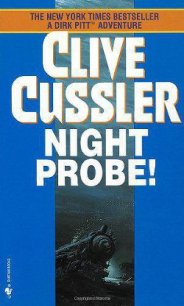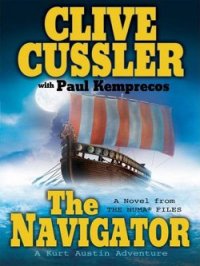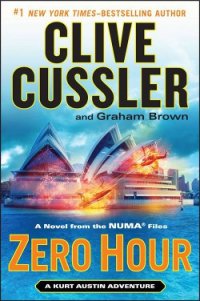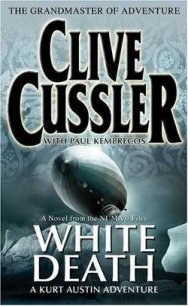Inca Gold - Cussler Clive (читаем полную версию книг бесплатно txt) 📗
Nor would someone who didn't know him guess that he was chief of NUMA's communications and information network. Admiral Sandecker had pirated him away from a Silicon Valley computer corporation to build a vast data library, containing every book, article, or thesis, scientific or historical, fact or theory, ever known to be written about the sea. What St. Julien Perlmutter's archive was to ships, Yaeger's was to oceanography and the growing field of undersea sciences.
He was sitting at his own private terminal in a small side office of the computer data complex that took up the entire tenth floor of the NUMA building when his phone buzzed. Without taking his eyes from a monitor that showed how ocean currents affected the climate around Australia, he picked up the receiver.
"Greetings from the brain trust," he answered casually.
"You wouldn't know gray matter if it splashed on your shoe," came the voice of an old friend.
"Good to hear from you, Mr. Special Projects Director. The office topic of the day says you're enjoying a fun-filled holiday in sunny South America."
"You heard wrong, pal."
"Are you calling from the Deep Fathom?"
"Yes, Al and I are back on board after a little excursion into the jungle."
"What can I do for you?"
"Delve into your data bank and see if you can find any record of a tidal wave that struck the shoreline between Lima, Peru, and Panama City sometime in March of 1578."
Yaeger sighed. "Why don't you also ask me to find the temperature and humidity on the day of creation?"
"Just the general area where the wave struck will do, thank you."
"Any record of such an event would likely be in old weather and maritime records I gleaned from Spanish archives in Seville. Another remote possibility would be the local inhabitants, who might have handed down legends of such an event. The Incas were good at recording social and religious occasions on textiles or pottery."
"Not a good lead," Pitt said doubtfully. "The Inca empire was smashed by the Spanish conquest nearly forty years earlier. Whatever records they made in recalling the news of the day were scattered and lost."
"Most tidal waves that come inland are caused by seafloor movement. Maybe I can piece together known geological events of that era."
"Give it your best try."
"How soon do you need it?"
"Unless the admiral has you on a priority project, drop everything else and go."
"All right," said Yaeger, eager for the challenge. "I'll see what I can come up with."
"Thanks, Hiram. I owe you."
"About a hundred times over."
"And don't mention this to Sandecker," said Pitt.
"I thought it sounded like another one of your shady schemes. Mind telling me what this is all about?"
"I'm looking for a lost Spanish galleon in a jungle."
"But of course, what else?" Yaeger said with routine resignation. He had learned long before never to anticipate Pitt.
"I'm hoping you can find me a ballpark to search."
"As a matter of fact, through clean living and moral thinking, I can already narrow your field of search by a wide margin."
"What do you know that I don't?"
Yaeger smiled to himself. "The lowlands between the west flank of the Andes and the coast of Peru have an average temperature of eighteen degrees Celsius or sixty-five degrees Fahrenheit and an annual rainfall that would hardly fill a shot glass, making it one of the world's coldest and driest low altitude deserts. No jungle for a ship to get lost in there."
"So what's your hot spot?" asked Pitt.
"Ecuador. The coastal region is tropical all the way to Panama."
"A precision display of deductive reasoning. You're okay, Hiram. I don't care what your ex-wives say about you."
A mere trifle. I'll have something for you in twenty-four hours."
"I'll be in touch."
As soon as he put down the phone, Yaeger began assembling his thoughts. He never failed to find the novelty of a shipwreck search stimulating. The areas he planned to investigate were neatly filed in the computer of his mind. During his years with NUMA, he had discovered that Dirk Pitt didn't walk through life like other men. Simply working with Pitt and supplying data information had been one long, intrigue-filled, vicarious adventure, and Yaeger took pride in the fact that he had never fumbled the ball that was passed to him.
As Pitt was making plans to search for a landlocked Spanish galleon, Adolphus Rummel, a noted collector of South American antiquities, stepped out of the elevator into his plush penthouse apartment twenty floors above Lake Shore Drive in Chicago. A short, stringy man with a shaven head and an enormous walrus moustache, Rummel was in his midseventies and looked more like a Sherlock Holmes villain than the owner of six huge auto salvage yards.
Like many of his extremely wealthy peers who compulsively amassed priceless collections of antiquities from the black market with no questions asked, Rummel was unmarried and reclusive. No one was ever allowed to view his pre-Columbian artifacts. Only his accountant and attorney were aware of their existence, but they had no idea of how extensive his inventory was.
In the nineteen fifties German-born Rummel smuggled a cache of Nazi ceremonial objects across the Mexican border. The contraband included presentation daggers and knights-cross medals awarded to Germany's greatest World War II heroes, as well as a number of historic documents signed by Adolf Hitler and his maniacal cronies. Selling his hoard to collectors of Nazi artifacts at premium prices, Rummel took the profits and launched an auto junkyard that he built into a scrap metal empire, netting him nearly 250 million dollars over forty years.
After a business trip to Peru in 1974, he developed an interest in ancient South American art and began buying from dealers, honest or criminal. Source did not matter to him. Corruption was as common as rain in a jungle among the brotherhood of artifact finders and sellers throughout Central and South America. Rummel gave no thought to whether his acquired pieces were legally excavated but sold out the back door, or stolen from a museum. They were for his satisfaction and enjoyment, and his alone.
He walked past the Italian marble walls of his foyer and approached a large mirror with a thick gilded frame covered with naked cherubs entwined around a continuous grapevine. Twisting the head of a cherub in one corner, Rummel sprang the catch that unlatched the mirror, revealing a concealed doorway. Behind the mirror a stairway led down into eight spacious rooms lined with shelves and filled with tables supporting at least thirty glass cases packed with more than two thousand ancient pre-Columbian artifacts. Reverently, as if walking down the aisle of a church toward the altar, he moved about the gallery, cherishing the beauty and craftsmanship of his private hoard. It was a ritual he performed every evening before going to bed, almost as if he were a father looking in on his sleeping children.
Rummel's pilgrimage finally ended at the side of a large glass case that was the centerpiece of the gallery. It held the crowning treasure of his collection. Gleaming under halogen spotlights, the Golden Body Suit of Tiapollo lay in splendor, arms and legs outstretched, the mask sparkling with emeralds in the eye sockets. The magnificent brilliance of the artistry never failed to move Rummel.




